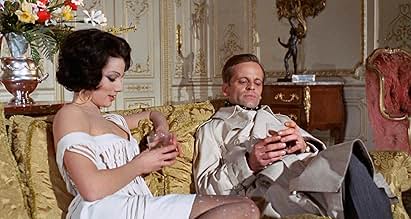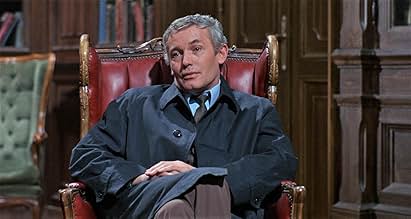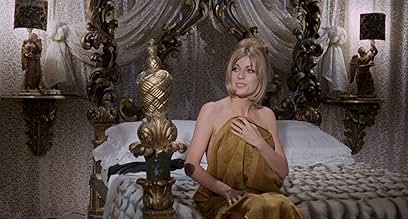Nachdem seine Frau durch eine Autobombe ums Leben gekommen ist, vermehrt sich, einige Zeit später, für ihren Mann John die Möglichkeit, das sie vielleicht doch noch am Leben ist.Nachdem seine Frau durch eine Autobombe ums Leben gekommen ist, vermehrt sich, einige Zeit später, für ihren Mann John die Möglichkeit, das sie vielleicht doch noch am Leben ist.Nachdem seine Frau durch eine Autobombe ums Leben gekommen ist, vermehrt sich, einige Zeit später, für ihren Mann John die Möglichkeit, das sie vielleicht doch noch am Leben ist.
- Horserace Spectator
- (Nicht genannt)
- Horserace Spectator
- (Nicht genannt)
- Man at crashed car
- (Nicht genannt)
- Policeman
- (Nicht genannt)
Empfohlene Bewertungen
If you are used to Kinski hamming it up in a Herzog epic, his role here is a revelation. As a London millionaire who may or may not have murdered his lesbian wife, he is so subtle and ambiguous, so - dare I say it? - restrained that he keeps us guessing right up until the last few seconds. Seeing her 'come back to life' in a porno film (shot after her death) Kinski's face takes on a haunted look that outdoes all his raving, eye-rolling and tooth-gnashing in more famous roles.
Proof, if proof were needed, that director Riccardo Freda was not just a great unsung visual stylist, but a maestro of mood and suspense. Imagine a Chabrol or Hitchcock with the eye of a Renaissance painter, and you come close to the splendours of this film. So exquisite in its visual detail that its minor flaws - i.e. blatantly fake model car wrecks; continuity howlers such as Kinski walking bareheaded through Soho, then sitting in a nightclub with his hat on - simply evaporate before our eyes.
Oh, and I even like the tacky Italian pop ballad that keeps recurring as a 'clue' - to oddly chilling effect. So perhaps I'm just a sucker for this type of film.
David Melville
Distinguishing Liz and Helen, however, is its Swinging London setting, complete with a disorienting visit to a hippie dance club with colored lights, topless birds, motorcycles, and psychedelic music. The attentive viewer will be further unsettled by the questionable motivation of its protagonist, straight-laced but tortured industrialist John Alexander, played by a simmeringly earnest Klaus Kinski.
The production values aren't consistently impressive. In one scene Kinski pretends to be pummeled by people clearly not in the same room, and the English actor who dubs the lead is laughably un-Kinski. Still, Liz and Helen does more than compensate for its shortcomings with mood and stylistic flair. Recommended to the open-minded and those wanting to see Kinski do something other than glare crazily, eat bugs, and kill people.
It's an old-school, late-sixties giallo, not a lot of sex and violence, more of a psychological thriller in the Hitchcock vein. While there are some interesting twists and turns, and the direction and acting are pretty good, it just misses the mark due to several issues.
First and foremost, Kinski just isn't right as 'the good guy'. He's a very good actor, but he's well-known for playing creepy characters, especially in the Edgar Wallace krimi films, the predecessors to the gialli. This character needed us to find him likeable and to care, but Kinski's strength isn't his charm and empathy, it's his intensity and anger.
In terms of craft, the photography is quite good, except that silly scene in the snow, which really should have been cut. Sometimes effects don't work. The acting and directing were competent.
The script is another weak point. They should have spent more time making us believe the relationship was authentic and they loved each other, so we'd believe his obsession with finding out if she was still alive. There are quite a few nothing conversations that could have added to the character development. The police investigation and red herrings could have been more fleshed out.
Really, they did a pretty good job overall, considering how quickly and cheaply they pumped these films out. But a bit more time on the script and a different casting choice would have made this one really sing.
Well actually, no. Kinski is at the most restrained I've ever seen him. That powerhouse of rolling eyes and bared teeth is subdued and on his best behaviour - or as much as you can be given the circumstances. It's strange seeing Kinski in the Edwidge Fenech/Dagmar Lassandra role (Nora Orland's incidental score has definite echoes of his subsequent work on 'The Strange Vice of Mrs Wardh', starring Fenech in the titular role).
A fairly standard giallo, which has moments of great interest - usually involving Kinski.
Wusstest du schon
- WissenswertesThough not an adaption of original material by Edgar Wallace, this film was advertised in Germany as part of the famous Edgar Wallace Series. It was such a huge flop that the producers at Rialto Film decided to delay any future plans to do further Wallace films. Due to the great success of Dario Argento's Das Geheimnis der schwarzen Handschuhe (1970), which was advertised as an adaption of a story by Wallace's son Bryan Edgar Wallace, Rialto's series re-started in 1971.
- PatzerWorst Dubbing Ever! Voices are heard on the audio while the actors are seen to be silent on screen, then flapping their mouths soundlessly on screen to silence in the audio.;
- Zitate
Liz: I knew your plan wouldn't work! You son of a bitch! If it wasn't for the inspector he would have killed me! And all because you wanted to grab your stepdaughter's money and become the real head of the company! Damn you! I told you you couldn't make this work!
Mr. Brown: You slut! I knew I couldn't trust you!
- Alternative VersionenNudity removed for US television screenings not restored to video. Rerelease in France had new sex footage featuring Alice Arno added.
- VerbindungenEdited from Der Mann mit dem Glasauge (1969)
- SoundtracksNon Dirmi Una Bugia
(Don't Tell Me a Lie)
Written by Nora Orlandi (uncredited)
Sung by Nora Orlandi (as Silvie St Laurent)
Top-Auswahl
- How long is Double Face?Powered by Alexa
Details
- Laufzeit
- 1 Std. 21 Min.(81 min)
- Sound-Mix
- Seitenverhältnis
- 1.85 : 1



























